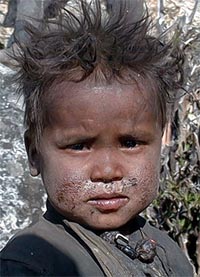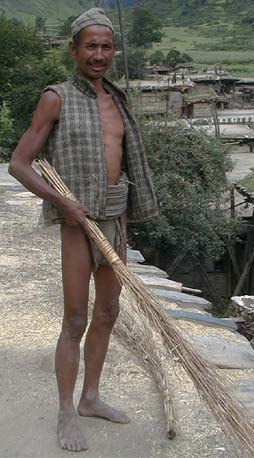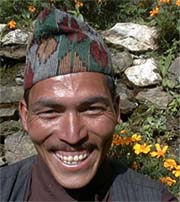| Kamal Budha's Life Story |
 |
 |
 |

Kamal: "Dad where are we about to go?" Kamal: "Why are we going to the office?" Kamal: "Does mother not have enough food for us?" Kamal: "Father, after you have got the money, please buy me shoes!" This is the true story of Kamal Budha and his family. They live in Dhadhaphaya village of Humla. Kamal Budha was the youngest son of his family. He was born in Bikram Sambat 2029 (1972), 29 years ago. He lived a hard life and worked for his days food. Kamal's father was born in Dolpa, but had to come to Simikot for work because he was very poor. Kamal's father, Gora Budha came to Simikot in 1944, when he was 10 years old. The area was famous for people employing the poor, but not giving them a good wage. Usually they worked for their days food, not for money and worked very hard. He worked for a rich person called Khadga Mahatara. He looked after the rich man's horses, he made rugs from wool, planted potatoes and looked after his fields. He lived in living quarters at the rich man's house. Whilst working there he met a female slave, who was a Brahmin (a high caste Hindu). She had two daughters with her. After becoming sick, she died leaving her children behind. So her two daughters had to work for the rich man. They worked in the fields and carried manure. Their lives were sad and hard.
When Kamal was 2 years old, his father left and married another woman, who lived in Dolpa. She was an outcast. Kamal's mother was left to bring up three young children alone. She had many problems, as she did not have any land of her own, so she did not have enough food for her children. She was very worried, became ill and quickly died. This meant that the children were not allowed to live in their small home, as the older two brothers left to work in a different area, but Kamal had to work for Khadga Mahatara and so lived in the staff quarters of the rich man. Kamal stayed there for many years, but did not like it. He went to Munigau to work for another rich person called Purna Lama. Khadga Mahatara was very angry that he had left and accused him of stealing money, but it wasn't true. Eventually he stopped accusing him. Kamal worked for the Munigau rich man and worked with his donkeys to transport rice, salt, kerosene and oil from Jarakot to Mugu. As he got older, he became taller, stronger and more knowledgeable. He met and married a local girl, called Bisakoli Rokaya. He became worried because he did not have a home for them both to live in. So they moved to Dillicot for four years and lived in one room of Sanka Mahatara's house. But this was not comfortable, so they begged to move to Hari Mahatara's house, but this was still only one room. Bisakoli became pregnant, so they had to discuss with Kamal's second brother, Sonam Budha, to arrange In 2006, Kamal started to work for RIDS-Nepal . There was one vacancy, but many people applied. He was employed, as a "peon" , an errand boy. With the RIDS-Nepal salary, he was able to bring up four children and send them to school, buy land and to build his own house. Now he has found peace and is very happy. He says, "To begin with I didn't have any money, therefore I was very sad. I was not able to buy my own clothes or food. My children were malnourished, as we didn't have enough food. Now I have enough money to buy food and clothes. My wife and family are happy, so I am happy too. I would like to thank RIDS-Nepal staff and friends for this happy and peaceful time in my life." |
 Gora fell in love with the eldest girl, called Chindolma and would help to carry the manure for her. After one year, they were married. They lived in a small empty house, which they built themselves. It only had two rooms. They still worked for the rich man. They had three children, three boys. Kamal was the youngest.
Gora fell in love with the eldest girl, called Chindolma and would help to carry the manure for her. After one year, they were married. They lived in a small empty house, which they built themselves. It only had two rooms. They still worked for the rich man. They had three children, three boys. Kamal was the youngest. living with his family. They lived with them for 3 years.
living with his family. They lived with them for 3 years.